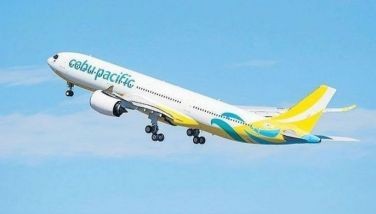San Miguel enters health drinks market
March 29, 2007 | 12:00am
Food and beverage giant San Miguel Corp. is entering the non-carbonated beverage market with the launch of new ready-to-drink tea and fruit juice products under the Magnolia brand.
In a statement, San Miguel said this was in response to consumers’ shift in preference to non-carbonated drinks like fruit juice and iced tea.
San Miguel, through newly-formed subsidiary San Miguel Beverage Inc. (SMBI), will launch anytime soon Magnolia Fruit Drink and Magnolia Health Tea in four flavors  pineapple, lemon, orange and apple.
SMBI’s entry into the domestic beverage business comes at a time when the market is in search of nutritious but more affordable beverages  from less calories and sugar to more vitamins and other nutrients  to fill a nutritional void in consumers’ diet.
The products will be available at leading supermarkets and stores nationwide and will be priced at P5 per bottle.
The move follows the sale by San Miguel of its 65-percent stake in softdrink unit Coca-Cola Bottlers Phils. Inc. (CCBPI) to Atlanta-based Coca-Cola Co. for $590 million.
Under the agreement signed with Coca-Cola Co., San Miguel is prohibited from selling carbonated drinks, sports drinks, energy drinks and/or flavored water for a period of five years from closing of the deal.
San Miguel has also committed not to engage in the business of producing, for itself and for certain competitors of Coca-Cola, non-alcoholic beverages anywhere in the world for a period of three years from closing and in the Philippines for five years.
The conglomerate said it decided to divest of CCBPI to allow it to focus on its bread-and-butter beer business and to raise funding for its planned acquisitions.
San Miguel and Coca-Cola’s five-year bottler’s agreement, which covers royalty charges and bottling restrictions on Coke products, ended in July.
San Miguel obtained the franchise to bottle Coca-Cola products in 1927. The franchise was then sold to Australia-based Coca-Cola Amatil for $27 billion worth of Coca-Cola Amatil’s shares. San Miguel re-acquired the franchise  with Atlanta-based Coca-Cola Co.  for $1.2 billion of stock, cash and assumed debt in 2001.
San Miguel’s profit last year was dragged down by CCBPI’s losses, while Coca-Cola booked an impairment charge of around $84 million, or nearly a third of the $268 million carrying value of its trademarks with CCBPI. CCBPI has suffered from declining sales volume as people turn to non-carbonated drinks.
Dominant in the domestic beer, dairy, processed food and poultry markets, San Miguel has expanded aggressively in Asia to reduce its reliance on the Philippines. Last year, it bought dairy giant National Foods for $1.5 billion and took over juice maker Berri Ltd., both based in Australia.
In a statement, San Miguel said this was in response to consumers’ shift in preference to non-carbonated drinks like fruit juice and iced tea.
San Miguel, through newly-formed subsidiary San Miguel Beverage Inc. (SMBI), will launch anytime soon Magnolia Fruit Drink and Magnolia Health Tea in four flavors  pineapple, lemon, orange and apple.
SMBI’s entry into the domestic beverage business comes at a time when the market is in search of nutritious but more affordable beverages  from less calories and sugar to more vitamins and other nutrients  to fill a nutritional void in consumers’ diet.
The products will be available at leading supermarkets and stores nationwide and will be priced at P5 per bottle.
The move follows the sale by San Miguel of its 65-percent stake in softdrink unit Coca-Cola Bottlers Phils. Inc. (CCBPI) to Atlanta-based Coca-Cola Co. for $590 million.
Under the agreement signed with Coca-Cola Co., San Miguel is prohibited from selling carbonated drinks, sports drinks, energy drinks and/or flavored water for a period of five years from closing of the deal.
San Miguel has also committed not to engage in the business of producing, for itself and for certain competitors of Coca-Cola, non-alcoholic beverages anywhere in the world for a period of three years from closing and in the Philippines for five years.
The conglomerate said it decided to divest of CCBPI to allow it to focus on its bread-and-butter beer business and to raise funding for its planned acquisitions.
San Miguel and Coca-Cola’s five-year bottler’s agreement, which covers royalty charges and bottling restrictions on Coke products, ended in July.
San Miguel obtained the franchise to bottle Coca-Cola products in 1927. The franchise was then sold to Australia-based Coca-Cola Amatil for $27 billion worth of Coca-Cola Amatil’s shares. San Miguel re-acquired the franchise  with Atlanta-based Coca-Cola Co.  for $1.2 billion of stock, cash and assumed debt in 2001.
San Miguel’s profit last year was dragged down by CCBPI’s losses, while Coca-Cola booked an impairment charge of around $84 million, or nearly a third of the $268 million carrying value of its trademarks with CCBPI. CCBPI has suffered from declining sales volume as people turn to non-carbonated drinks.
Dominant in the domestic beer, dairy, processed food and poultry markets, San Miguel has expanded aggressively in Asia to reduce its reliance on the Philippines. Last year, it bought dairy giant National Foods for $1.5 billion and took over juice maker Berri Ltd., both based in Australia.
BrandSpace Articles
<
>
- Latest
- Trending
Trending
Latest
Trending
Latest
Recommended




























